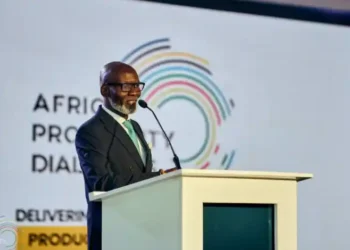Ghanaian businesses are calling for a reduction in interest rates to enable them to raise funds for their businesses as COVID-19 continues to affect their operations.
A survey conducted by the Ghana Statistical Service saw 67% of businesses citing a reduction in interest rates as their topmost desired policy intervention.
Aside from low-interest rates, two other policies that firms desire in the second-round survey were cash transfer (41%), and deferral of rent payment (25%).
Compared to the first-round survey, it was realized that the topmost policy desire of firms does not change since the onset of the coronavirus pandemic in Ghana. However, the number of firms calling for a low-interest rate went up from 61% in the first round of the survey. Also, 32% and 15% of firms respectively called for desired cash transfers and deferral of rent payment in the first round of the survey.
High-interest rates have been one of the major constraints to Ghanaian businesses over the years. Whilst the Monetary Policy Committee has done so well to reduce the prime rate which is currently maintained at 14.5%, the banks have been reluctant to reduce their lending rates.
It has become very difficult to understand the reason why banks do not want to reduce their lending rates to reflect the monetary policy rate. Nevertheless, one of the reasons most cited by the banks is the high risk of non-performing loans which currently stands at 15.3% as of October 2020 above pre-COVID levels of 14.3% in December 2019.
Currently, with the coming into effect of the African Continental Free Trade Area (AfCFTA) on January 1, 2021, it will be very difficult for Ghanaian businesses to remain competitive as a result of the high cost of borrowing in the country.
The President of the Ghana Union of Traders Association (GUTA), Dr. Joseph Obeng, has earlier called on the government of Ghana to address the high cost of borrowing in the country. He was of the view that failure to do this, will edge out Ghanaian businesses by their competitors as a result of the implementation of the AfCFTA.

“We are going to compete with other African countries, and it’s going to be very competitive especially when we have been talking about the cost of doing business here, in terms of borrowing. The cost of borrowing is very high and so, if we do not do anything about that aspect, it means that we are going to be outdone by the other African countries who have affordable credit”, the GUTA President said.
The AfCFTA aims to create the world’s largest free trade area with the potential that brings together more than 1.2 billion people with a GDP of over $2.5 trillion and usher in a new era of development. It has the potential to generate a range of benefits through economy of scale, trade creation, structural transformation, productive employment, and poverty reduction.
This means that the prospects of the AfCFTA for Ghanaian businesses are enormous. However, it can be observed that unless the government creates an enabling business environment that sets a common playing ground for all, only the large businesses stand to gain.
The second round of the COVID-19 Business Tracker Survey (BTS) conducted by the Ghana Statistical Service (GSS), shows that 95 percent of large firms in Ghana believe the implementation of AfCFTA will contribute significantly to improving their businesses. Per this survey, the large firms see more benefits from the AfCFTA than smaller firms and are also more aware.
There is a need to create more awareness of the benefits of the AfCFTA to Ghanaian businesses because the GSS found that the level of awareness is still very low, as only a quarter of firms, representing 26.2 percent report that they are aware of the AfCFTA.
Despite having the secretariat in Ghana, it is still not clear whether as a country, Ghana is ready for the AfCFTA. The GUTA president made it clear that Ghanaian traders are still not ready for the AfCFTA. There is still a lack of understanding with regards to the rules guiding the whole agreement.
The lack of understanding of the trade agreement is, however, not limited to Ghanaian traders as the National Association of Nigerian Traders (NANTS) has also called on the Trade Ministry in Nigeria to develop a synthesis that summarizes all items negotiated on the AfCFTA agreement to clarify implementation. Hence a question that begs for answers; Is Africa prepared for trade integration?
In addition to awareness creation, the government must dialogue with banks to resolve the issue of high-interest rates in the country which is among the highest in the African continent, to make Ghanaian businesses more competitive to harness the full benefits of the AfCFTA.





















